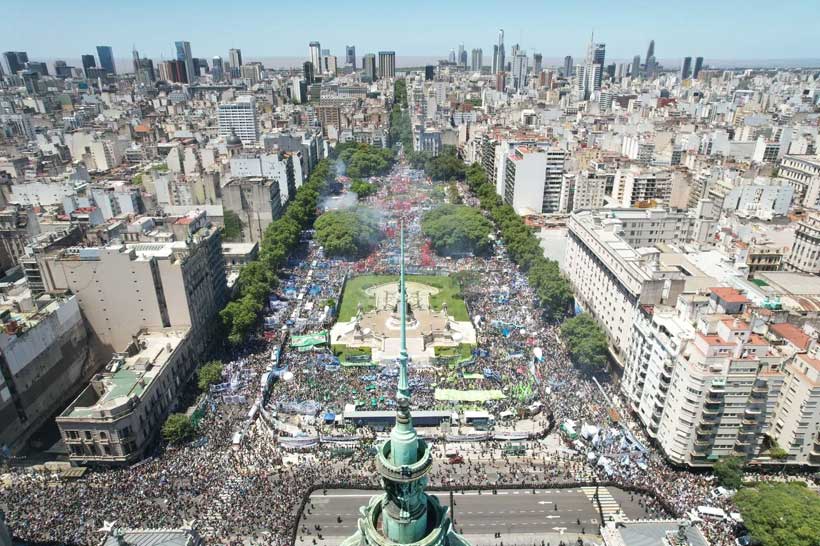“The country is not for sale,” “No to the adjustment,” and “No to the labor reform,” were some of the main slogans of the demonstration that filled the Plaza del Congreso in the city of Buenos Aires. Hundreds of thousands of demonstrators took part in the massive general strike against Milei and his “libertarian” policies. Milei took office on December 10. Some outlets, such as Left Voice and Progressive International, reported that over a million demonstrators took to the streets.
It is also the first mobilization of this type to be carried out with such haste in the history of this country, since the president has only been in office for 45 days.
The protest was due to the fact that, in such a short period, Milei presented initiatives that would radically transform the South American country and affect multiple sectors.
The main measures in question are Milei’s Decree of Necessity and Urgency (DNU) and the “omnibus law.” Courts halted some of the provisions of the DNU, which would have damaged labor in Argentina, while the omnibus law was approved, by a slim margin, by the ruling party but will face a litmus test on Thursday or Friday, when it is discussed in a plenary session in the Chamber of Deputies.
The judicial and legislative tension caused by these measures was fueled by the announcement of the national strike by the General Confederation of Labor (CGT), the largest union confederation in Argentina, and to which the Central Workers of Argentina (CTA) joined along with the Association of State Workers (ATE).
Human rights groups such as the Grandmothers of Plaza de Mayo, independent workers, university students, teachers, micro-entrepreneurs, producers, LGBTQ activists, feminists, disabled people, writers, artists, athletes, and a range of social organizations joined the massive march in Buenos Aires.
The protests were replicated in the main cities around the country such as Rosario, Córdoba, Ushuaia, Misiones, Santiago del Estero, Chubut, Mar del Plata, Bahía Blanca, Tucumán, Santa Fe, Río Negro, Bariloche, Jujuy, and Mendoza.
In addition, there was international support, since union centers and organizations of Argentinians living abroad demonstrated in Mexico, Brazil, Chile, Paraguay, Uruguay, Peru, Spain, France, Belgium, Italy, Portugal, Germany, and Holland.
On the political level, one of the most significant participants in the mobilization was the governor of the province of Buenos Aires, Axel Kicillof, who is emerging as one of the most important leaders of Peronism during the current government.
The strike, which began at noon and will end at midnight, was downplayed early on by Milei and his ministers, who took to social media to insult the protesters.
“Mafiosi,” “poverty managers,” “corrupt,” “oligarchs,” “false representatives of workers,” “privileged,” “anti-democrats,” and “minorities” were some of the terms used by the respective ministers of security (Patricia Bullrich), foreign affairs (Diana Mondino), and of the economy (Luis Caputo), as well as by the presidential spokesperson Manuel Adorni, to slander the demonstrators. In addition, Bullrich attempted to minimize the number of strike participants.
